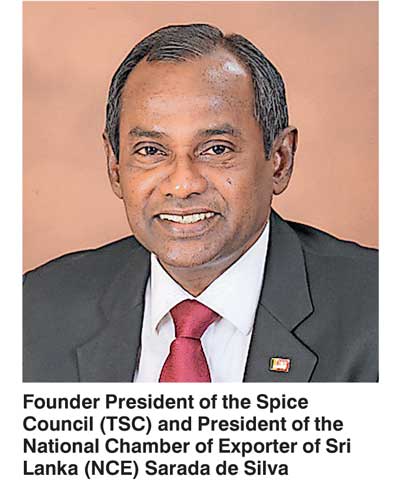Wednesday Feb 25, 2026
Wednesday Feb 25, 2026
Monday, 31 October 2016 00:01 - - {{hitsCtrl.values.hits}}
 The cinnamon industry is pleased regarding the announcement that the Cabinet has approved amendments to the Intellectual Property Act of 2003 to enable Ceylon Cinnamon to obtain GI locally, and be included in a GI register. This measure will pave the way for certification of cinnamon products originating in Sri Lanka in regard to GI which is a necessary step for international registration of Ceylon Cinnamon to benefit from GI which is the highest level protection.
The cinnamon industry is pleased regarding the announcement that the Cabinet has approved amendments to the Intellectual Property Act of 2003 to enable Ceylon Cinnamon to obtain GI locally, and be included in a GI register. This measure will pave the way for certification of cinnamon products originating in Sri Lanka in regard to GI which is a necessary step for international registration of Ceylon Cinnamon to benefit from GI which is the highest level protection.
The industry is now hopeful that the Draft Bill in this regard will be approved by Parliament, and a local GI register will thereafter be established by the Intellectual Property Office (NIPO) to enable Ceylon Cinnamon to be registered in the local GI register.
The cinnamon industry has been lobbying the Government for a long time to register Ceylon Cinnamon for Geographical Indications in the European Union and other major consumer markets. The delay in this process was due to a lack of protection in relation to Intellectual Property Registration locally and the lack of a local register for GI.
The Export Development Board (EDB) has been authorised by the Government to be the holder and protector of the Ceylon Cinnamon Certification mark and the Geographical Indications, on behalf of the People of Sri Lanka. The industry now hopes that the EDB will immediately take the necessary steps to register Ceylon Cinnamon in terms of GI.
Obtaining GI Internationally depends on the proper protection of quality, and traceability of Cinnamon Products originating in Sri Lanka. In this regard it is necessary that the EDB implements proper controls over the quality and traceability in the production processes of Ceylon Cinnamon to ensure GI for Ceylon Cinnamon Internationally.
The ground work hitherto carried out by the Spice Council, the Ceylon Cinnamon Association and the Cinnamon Training Academy as well as the State Organisations has gained much publicity commanding an increase in the prices for Ceylon Cinnamon. Sarada de Silva Founder President of the Spice Council (TSC) and President of the National Chamber of Exporter of Sri Lanka (NCE) has worked tirelessly from the private sector towards this end. He has through the NCE presented budget proposal for 2017 Budget. All these proposals are private and public sector partnerships to meet the current demand and necessity of the cinnamon Industry. They are, establishment of 250 Good Manufacturing Production Centres (GMP), establishment Bought (Green) Tree factories, 2nd Stage of Cinnamon Training Academy at Kosgoda, Research and Mechanisation of Cinnamon Processing, Skills Development in the Cinnamon industry, Geographical protection GI for Ceylon Cinnamon, Acceding to Madrid and Lisbon agreements and establishment of Cinnamon Development Authority.
Unfortunately all the good work done by the State sector and the Private sector is negated by a few unscrupulous exporters resorting to the export of poor quality Cinnamon, resulting in the rejection and return of many containers by International buyers. This has been compounded by the importation into Sri Lanka of Cinnamon from Madagascar for the purpose of re-export as Ceylon Cinnamon thereby destroying the name an image of Ceylon Cinnamon.
In this context since the EDB has the right of ownership of the Ceylon Cinnamon mark should take necessary action not only to own the mark but also to defend the mark from such irregular practices including the adulteration and imitation of Ceylon Cinnamon by ‘Cassia’ which is a cheaper substitute.